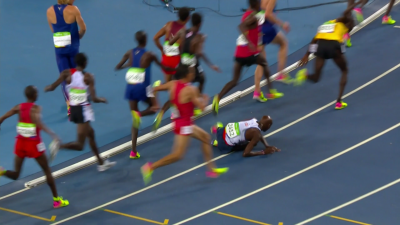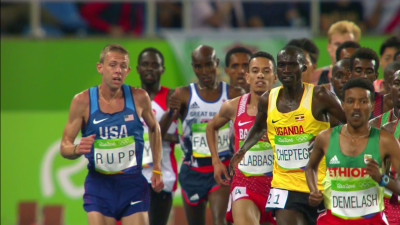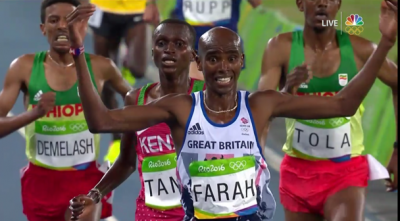Mo-nificent: Mo Farah Repeats As Olympic 10,000 Meter Champion
by LetsRun.com
August 13, 2016
RIO DE JANEIRO — Great Britain’s Mo Farah used a 4:02 final 1600 and 55-second last lap to close off a 13:11 final 5000 and become the fifth man in history to successfully defend his Olympic 10,000-meter crown by running 27:05.17. Kenya’s Paul Tanui moved up a spot from his runs at the 2013 and 2015 World Championships and got the silver (27:05.64) as Ethiopia’s Tamirat Tola was third (27:06.26).
American Galen Rupp, who won the silver medal behind his training partner Farah four years ago, was in a contention for a medal, as he has so often been in recent years, until the final 300. He ended up fifth in 27:08.92.
Farah won despite falling early in the race after being clipped by Rupp.
Recap below, followed by analysis.
The Race (video highlights here)
Conditions were good for running at the Olympic Stadium as it was 66 degrees with some light wind at the start of the race. 2015 Worlds silver medallist Geoffrey Kamworor, whom many assumed would be the biggest threat to Farah, blasted off the line into the lead, and by 400 meters (67.2), Tanui and Kamworor were running at the front of the pack, with Rupp right behind them. Farah felt no need to rush and was in dead last, even waving to the crowd as he ran on the first lap.
The biggest question coming in was whether the Kenyans would echo their team tactics of a year ago in Beijing in an attempt to drop Farah before the final lap. We got our answer early as the pace slowed to 71’s for laps two and three and 1600 was hit in just 4:37 (28:51 pace).
The pace picked up slightly on the fifth lap (66.5), and during the third kilometer, Farah finally decided he’d had enough of running in last place and made his way up to the front of the pack. Just before 2800 meters, Farah took the lead and tried to slow the pace down, but Tola was not going to let that happen. He and Ethiopian Trials champ Yigrem Demelash worked together to keep the pace somewhat honest, clicking off a pair of 65’s, before the race’s first dramatic moment occurred on lap 10.
Farah was near the front of the pack, just ahead of Rupp, when the two men tangled on the turn and Farah hit the track. Farah got up quickly and lost roughly 20-30 meters. Rupp, concerned for his some-time training partner, began looking back repeatedly on the homestretch to check on Farah, slowing himself deliberately in the process, and Farah gave him a thumbs up sign. The Ethiopians, who had picked up the pace to a 63.9 on the previous lap, were oblivious and did not try to capitalize by pushing the pace up front. Tola led the field through 5k in 13:53 and 300 meters later, Tanui moved into the lead, followed by the other Kenyans, Kamworor and Bedan Karoki, plus Farah. Would the Kenyans try to hammer it home from here?
Tanui dropped a couple of 65’s, but at 6k (16:37.20) the lead pack consisted of a massive 17 people — and it was growing, as the chase pack was actually bridging the gap to the leaders. Tanui and Karoki worked together over the next few laps as the pack began to string out, but they slowed again on lap 18 (66.8).
That’s when Demelash decided he had had enough and launched into his long drive for the finish. He dropped a 62.6 on lap 19, the fastest of the race to that point, and the contenders were beginning to separate themselves from the herd. Another 62 brought them to a mile to go, and at that point the lead pack had been reduced to five men: Demelash, Tola, Tanui, Farah and Rupp. 2014 world junior champ Joshua Cheptegei of Uganda was a few meters back, with Karoki a few more meters behind him. Kamworor, looking like a shell of the man who gave Farah all he could handle in Beijing last year and spanked him at the World Half Champs back in March, was off the back and would play no further role.
Demelash continued to press with a 62.7 before Farah moved to the front with 1k to go. He kept it rolling the next two laps (62.8, 61.2) and hit the bell in the lead with Tanui on his shoulder and Rupp directly behind him in third. Tola sat on Rupp’s outside with Demelash slightly behind the four of them. Tanui made a hard move with 300 meters remaining and though Farah allowed him to go by, he stuck close — a favored tactic of the Brit’s in recent years. Tola moved into third as Rupp reached down for his kick. But nothing was there. The medals were slipping away.
Tanui sprinted around the final turn, but he still could not shake Farah, who swung wide entering the home stretch. Farah moved into the lead without much trouble and moved directly in front of Tanui, forcing the Kenyan to move either inside or outside if he wanted the Olympic title. But as Farah reached top gear, Tanui just could not make up the ground.
Farah held him off to repeat as Olympic champion, his final lap covered in 55.37 seconds. Though that was far slower 53.48 he ran to win this race in London four years ago, the final 5k — roughly 13:11 for Farah — was much, much faster. Despite hitting halfway in 13:53, Farah ran a quick 27:05.17 and came just four seconds shy of breaking Kenenisa Bekele‘s Olympic record.
Tanui got the silver, though the battle for the bronze was tight all the way to the finish, with Tola barely holding off the late charge of Demelash by the narrowest of margins, 27:06.26 to 27:06.27. Rupp, knowing he was defeated in the final straight, slowed over the final few meters and crossed the line dejectedly in fifth place before falling to the track.
Results
|
|||||||||||||||||||||||||||||||||||||||||||||||||||||||||||||||||||||||||||||||||||||||||||||||||||||||||||||||||||||||||||||||||||||||||||||||||||||||||||||||||||||||||||||||
Quick Thought #1: Mo Farah joins some legendary names – Nurmi, Zatopek, Viren, Gebrselassie, and Bekele as double Olympic 10,000 champ
The men who have won two Olympic titles are some of the biggest names in the history of distance running. Only five men, counting Farah, have successfully defended their Olympic 10,000 title. That being said, it’s been happening a lot lately as someone has been winning or repeating as 10,000 champ for each of the last six Olympics.
History’s Double Olympic 10,000 Champions
Paavo Nurmi (1920 and 1928)
Emil Zátopek (1948 and 1952)
Lasse Viren (1972 and 1976)
Haile Gebrselassie (1996 and 2000)
Kenenisa Bekele (2004 and 2008.
Mo Farah (2012 and 2016)
Quick Thought #2: Mo Farah’s thoughts on the fall
“I was thinking don’t panic, don’t panic, don’t panic,” Farah said. “At that point mentally, I was thinking, ‘Is the race done, is the race done?’ and I was telling myself ‘No, no, no, I worked too hard for this.’ I promised my daughter Rihanna I was going to get a medal and I wasn’t going to let her down.
“As soon as I got up, I was hoping the guys didn’t see me fall up front. If it happened, five laps to go, six laps to go, I think the race would have been over.”
Farah said he he had promised Rihanna a medal here, because in London 2012 he dedicated his two Olympic golds to his soon to be born twin daughters.
Quick Thought #3: Farah’s toughest press conference question
During the press conference, Farah was asked by Irish journalist Ewan McKenna about his association with Jama Aden. Included below is a partial transcript of their exchange:
McKenna: I was wondering as someone who preaches clean athletics, I was wondering about your association, and repeatedly, your association with people from [Alberto] Salazar to John Smith to [Jama] Aden. And secondly, in terms of Aden, when you explained it, you said he was just holding a stopwatch for you yet his daughter on Twitter today was posting pictures of you having dinner at his house and she said and I quote, ‘We’re very good friends and my dad trains with him.’
Farah: Sorry, who’s that?
McKenna: Jama Aden.
Farah: Obviously, you know it’s a small sport… There’s so many athletes by getting pictures of them — obviously you’re taking a picture, you’re not going to say no, are you? So it doesn’t mean you train with them.
EPO was found at the hotel that Aden and his athletes were staying at in June, and Aden has been under investigation by the IAAF for the past three years, though he has not been banned. Farah has said in the past that Aden is not his coach, but he has often trained and eaten with Aden’s athletes during his training stints in Ethiopia, which naturally has some journalists such as McKenna curious about how deep Farah’s connection goes.
Quick Thought #4: Rupp shouldn’t be hanging his head about failing to repeat as a medalist as it’s very hard to do.
Tonight, Rupp was trying to become the first American with multiple Olympic mid-d or distance medals since Kim Gallagher in 1988, the first man since Frank Shorter in 1976 and only the fourth American period since World War II. Rupp did not join them tonight, but he has another chance in next week’s marathon.
Multiple American Mid-d/Distance Medallists Since WWII
Mal Whitfield (800 gold in ’48 and ’52)
Frank Shorter (marathon gold in ’72, silver in ’76)
Kim Gallagher (800 silver in ’84, bronze in ’88)
The race was essentially a re-run of last year’s World Championship final in Beijing. Though the race closed harder tonight (splits of 13:40/13:21 for the leaders in Beijing vs. 13:53/13:12 tonight), Rupp was in the same exact position: in a pack of five men at the bell. And once again, once the eventual medallists took off with 300 meters to go, Rupp could not respond and had to settle for fifth place.
“[I was] pretty disappointed,” Rupp said. “I came in here with high hopes. It was a good race, it was perfect for me…I think I ran pretty well tactically, putting myself in a good spot. Just didn’t quite have the wheels at the end.”
Rupp said that his marathon training this year may have impacted his ability to close but that from the Olympic Trials until now, he’s really been working on his speed.
“[I had] done some great speed workouts, was sprinting as well as I ever have. I was confident in my kick, I just didn’t have as much at the end as I had hoped.”
Rupp said it will probably take him a day to get over tonight’s result, but then he’ll be 100% focused on next Sunday’s marathon, which offers an opportunity at redemption.
“I think if I run well in the marathon, I’ll forget about this one pretty quick.”
Quick Thought #5: What happened to the Kenyans?
One Kenyan, Paul Tanui, deserves major props. He’s now medalled in three straight global championships over 10,000 meters, and his silver medal tonight was the greatest accomplishment of his career to date. The other two, Geoffrey Kamworor and Bedan Karoki, will be leaving Rio wondering how it all went so wrong. We did not get a chance to ask them directly (both declined to speak to us in the mixed zone) but these clearly were not the same runners who took it to Mo Farah in Beijing last year or Cardiff this year. In retrospect, the results of the Kenyan Trials presaged what was to come in Rio. Tanui ran great, 27:46 at altitude to win by 11 seconds as both Kamworor and Karoki dropped out. Karoki and Kamworor finished the race tonight, but if you told us they would finish 7th and 11th, we wouldn’t have believed you.
Quick Thought #6: Leonard Korir will take 14th in the world on a limited buildup
Korir was pleased with his result today, especially considering he missed five months of running due to his military training in the U.S. Army, which concluded in January. Korir did some running with his unit while he was stationed at Fort Leonard Wood in Missouri, but nothing that would help him maintain fitness — a mile or two at 11-minute-mile pace.
But he got back into training in February and has rounded into shape nicely. He’s clearly a lot fitter now than he was in April at Stanford, when he ran 27:58, and being able to focus on running full-time via the Army’s World-Class Athlete Program should allow him to reach greater heights in 2017.
Quick Thought #7: Zane Robertson sets a new Kiwi national record and is sick of talking about drugs
Zane Roberston ran a new New Zealand national record of 27:33.50 for 12th place, breaking Dick Quax’s nearly 40-year-old record of 27:41.95. Zane said he “got the most out of myself today” and “I’m absolutely delighted to be top 12 in the world.”
Quax took losing his record with class posting on Twitter:
https://twitter.com/DickQuax/status/764640331795013632?ref_src=twsrc%5Etfw
https://twitter.com/DickQuax/status/764641291162357760?ref_src=twsrc%5Etfw
Zane is most well-known for moving with his twin brother Jake to Kenya as a teenager. He now trains in Ethiopia and his training partner Tamirat Tola got the bronze. Before the meet, Zane said he had received death threats from Kenyans for speaking out about drugs. He was asked how bad the drug problem was in Kenya and he said, “It’s pretty bad. It’s very bad. .. Positive tests are hidden away for bribe money. It’s a big problem.”
When we asked him if there was a drug problem in Ethiopia, he said, “They are a lot better… Because it’s (Addis Ababa) a big city, I don’t see anything there. Kenya’s a small running community, I see a lot more… I can only coment on what I know personally. I wouldn’t make anything up… Surely they (drugs) are in every East African country now… There must be some type of problem because the mentality now to just join the game (is to do drugs).”
We asked him if what we were watching was a farce and he reiterated for legal reasons he could not name names or say how many top guys he believed were doping but he said, “What I can say today is a lot of the top guys are dirty. If they were clean they still would be great athletes maybe at the top of the world, I’m just saying they add a little bit more.”
We had an agent tell us anonymously today he felt the drug situation in Kenya changed a lot the last five years with the mentality being drug use is necessary on the roads and that there are a few Kenyan doctors who peddle the drugs to make more money from athletes.
When a journalist asked Zane if he felt people in today’s field were dirty, Zane had had enough and said, “I’ve had enough… I’m just pissed off right now, that was too much man. I’ve answered. I will talk more (later) guys but not right now I want to enjoy my moment. I’m think I’m done here.”
Former NCAA Star David McNeil finishes 16th
Former Northern Arizona University star David McNeil was 16th in 27:51.71. He was pleased with the result and effort. He said his coach told him to “run something you can finish and you can be proud of.” David said, “I’m definitlely proud of that,” noting that he got a stich early on but battled on. He “lost a little confidence” the last 5 laps, but overall had a solid race.
Shadrack Kipchirchir Finishes 19th, Says Goal was to Medal
Team USA’s Kipchirchir was not happy with how he ended up tonight in 19th place (he finished 16th at Worlds last year), saying his goal was to get a medal. He said this was a good learning experience and he now knows you “have to work very hard to go with the main pack.”
Kipchirchir takes some solace that Mo Farah was a late bloomer to the top of the sport. As for beating Farah, he made it sound impossible, saying, “if the pace goes slow, it favors him. If it goes hard, it favors him so there is nothing you can do about it.”
Up next is the Amry 10-Miler road race in October which should be a great one with four US Army track distance athletes on Team USA in Rio.
Mo Ahmed Finishes Last, Still Has the 5k
Mo Ahmed of Canada took his running to a whole new level earlier this year when he ran 13:01.74 at Pre for third place, lowering his PR (and Canadian record) from 13:10.00. Tonight was his first 10,000 of the year and it didn’t turn out how he wanted. He fell off the pack and eventually just tempoed it in to save himself for the 5000m, finishing in last place. The Jerry Schumacher-coached athlete said, “ I thought I was ready for it. I think I did a little to much surging at the beginning. With 8 laps to go, my legs just couldn’t sustain it. It was sort of like a washing machine early on. Once I fell off, I guess just make that a cooldown, get ready for the 5k.”
Talk about the race on our world famous fan forum / messageboard:
- More OTB: Mo GOAT run
- Rupp just tripped Mo
- RUPP goes home DEVASTATED
- KAMROWOR GOES HOME DEVASTATED
- OK OK did anyone else see that? Rupp & Salazar greeting Mo, Salazar definitely doesn’t coach Mo anymore.
- How many RUPP threads will be created?!?






